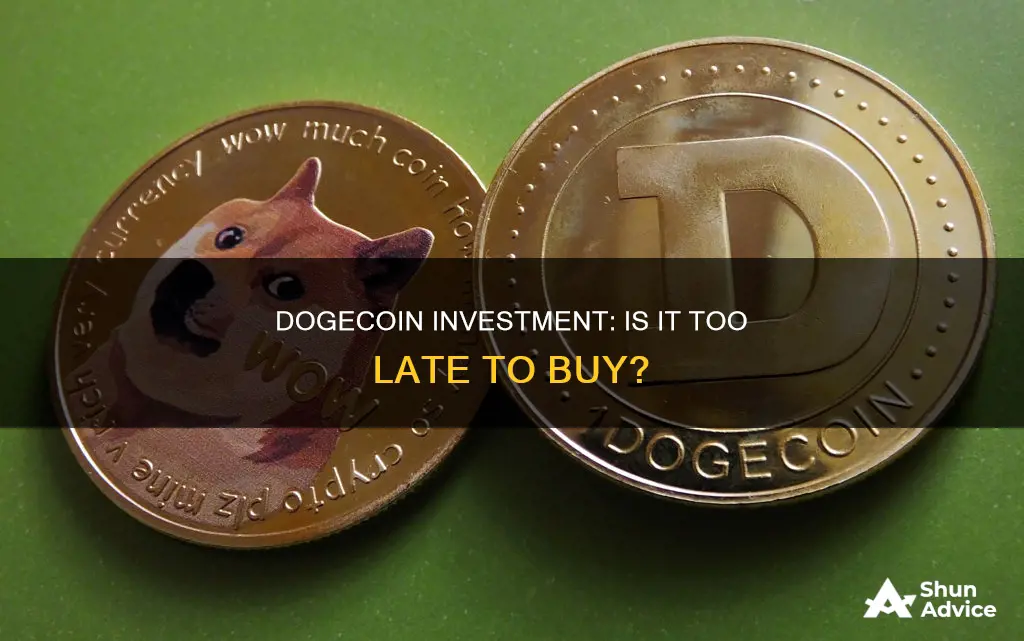
Dogecoin is a cryptocurrency that has sparked both optimism and scepticism in the crypto world. It is a risky, volatile investment, and should only be purchased if you are in a strong financial position and can afford to lose money. Dogecoin is one of the more affordable cryptocurrencies on the market, but it is also one of the most dangerous investments. It is important to do your research and proceed with caution when investing in Dogecoin.
| Characteristics | Values |
|---|---|
| Risk | Dogecoin is a risky, volatile investment. |
| Affordability | Dogecoin is one of the more affordable cryptocurrencies on the market. |
| Transaction costs | Dogecoin's average transaction cost is under 10 cents, which is on the low end of cryptocurrency transaction fees. |
| Long-term growth | Dogecoin's growth may or may not be sustainable. |
| Real-world utility | Dogecoin lacks real-world utility as it is not widely accepted by merchants. |
| Competition | Dogecoin does not have any major advantages over its competitors. |
| Celebrity endorsements | Dogecoin has received endorsements from celebrities such as Elon Musk and Snoop Dogg. |
| Community support | Dogecoin has a strong community of supporters. |
What You'll Learn

Is Dogecoin a good investment?
Dogecoin is a cryptocurrency that was created as a joke in 2013, inspired by the popular Shiba Inu meme. Despite its humorous origins, it quickly gained a passionate following due to its friendly mascot and active community. Dogecoin has seen both triumphant highs and crashing lows over the years, and its value is highly volatile and influenced by social media.
Dogecoin is a risky, volatile investment, and whether it is a good investment depends on your financial situation, risk appetite, and investment goals. Here are some key points to consider:
Risk and Volatility
Dogecoin is subject to extreme fluctuations in value due to its unlimited supply and susceptibility to social media movements and hype. Its price surges have been largely driven by online investors pumping up its price, similar to the GameStop saga. As such, Dogecoin is a high-risk option, and investors should be prepared to potentially lose their entire investment.
Real-World Utility
Dogecoin currently has limited real-world utility, as it is not widely accepted as a form of payment by merchants. Most merchants that do accept cryptocurrency are more likely to accept Bitcoin. Dogecoin also has higher transaction fees and uses more energy than some other cryptocurrencies, giving it fewer competitive advantages in the industry.
Long-Term Growth Potential
Dogecoin's long-term growth potential is uncertain. Its fundamentals may not be as strong as larger cryptocurrencies like Bitcoin and Ethereum, which have more real-world utility and a stronger competitive advantage. Dogecoin's future depends on its ability to gain widespread adoption, improve its technology, and develop a way to stay competitive.
Investment Alternatives
Dogecoin is not the only investment option in the cryptocurrency space. Bitcoin and Ethereum are two of the biggest and most well-known cryptocurrencies, with strong track records and wider acceptance by merchants. These alternatives may offer more stable and consistent returns over the long term.
Regulatory Considerations
It is important to note that cryptocurrency is a highly speculative and unregulated market. The value of Dogecoin and other cryptocurrencies can be subject to rapid changes due to regulatory announcements or other factors.
In summary, investing in Dogecoin carries significant risks and should only be considered if it aligns with your investment strategy and risk tolerance. It is crucial to do your own research, assess your financial situation, and understand the potential risks and rewards before investing in Dogecoin or any other cryptocurrency.
Smart Strategies to Invest 10K in Bitcoin
You may want to see also

Dogecoin's risks and challenges
Dogecoin is a cryptocurrency that was initially created as a joke, making fun of the wild speculation in cryptocurrencies at the time. Despite its satirical nature, some consider it a legitimate investment prospect. However, investing in Dogecoin comes with several risks and challenges that potential investors should be aware of.
Price Volatility
Dogecoin is known for its highly volatile nature, with prices fluctuating rapidly within short periods. This volatility can result in substantial gains or losses, depending on the timing of trades. Dogecoin's price movements are often closely tied to Bitcoin's performance, so traders need to be mindful of Bitcoin's price movements.
Security Risks
Dogecoin transactions are conducted through digital wallets, which are susceptible to hacking and theft. Cryptocurrency exchanges, where Dogecoin is traded, have been frequent targets of hacking and theft. Scams and fraudulent activities are also prevalent in the cryptocurrency trading space, including Ponzi schemes, fake investment opportunities, and phishing attempts.
Lack of Real-World Utility
Dogecoin currently lacks real-world utility, as it is not widely accepted by merchants as a form of payment. Without widespread adoption, it will be challenging for Dogecoin to become a mainstream form of currency. Other cryptocurrencies offer lower transaction fees and use less energy, giving them a competitive advantage over Dogecoin.
Technical Problems
Dogecoin is rarely updated, which is concerning given the thousands of lines of code that require attention. Due to its close relationship with Bitcoin and Litecoin, Dogecoin consists of complex code that needs ongoing maintenance.
Speculative Nature
The speculative nature of Dogecoin trading increases the risk of speculative bubbles and market crashes. Dogecoin's price is largely driven by social media movements and hype, making it prone to extreme fluctuations.
Regulatory and Legal Uncertainties
Different countries have varying regulatory perspectives on cryptocurrencies, including Dogecoin, which can impact trading activities. There are also tax implications to consider, as profits made from selling Dogecoin are generally subject to capital gains tax, and crypto-to-crypto trades may trigger taxable events.
Lack of Development Team
Unlike most other cryptocurrencies, Dogecoin does not have a dedicated development team working on it. This means that there may not be prompt solutions to any technical problems that arise.
In conclusion, while Dogecoin has seen impressive growth and has a dedicated community, it is a risky and volatile investment. Potential investors should carefully consider these risks and challenges before deciding whether to invest in Dogecoin.
Hedge Funds: Exploring Bitcoin Investment Opportunities
You may want to see also

Dogecoin's potential uses
- Tipping Service: One of the most common uses of Dogecoin today is as a tipping service. Users can tip others for posts or contributions they find valuable, similar to a "like" but with more impact. This has helped to foster a sense of community and encouragement within the Dogecoin ecosystem.
- Charitable Efforts and Fundraisers: The Dogecoin community has come together to fund various charitable efforts and projects. They have even managed to sponsor a NASCAR event, demonstrating their ability to organize and raise significant funds.
- Alternative Investment: Dogecoin has gained traction as an alternative investment option, particularly for those interested in cryptocurrency. Its low price and high volatility make it an attractive option for speculative investors. However, it's important to note that Dogecoin is a risky and volatile investment, and its price is largely driven by social media movements and hype.
- Digital Payment System: Dogecoin was developed as a digital form of payment system, similar to Bitcoin or Litecoin. However, it has yet to gain widespread adoption, as most merchants do not accept it as a form of payment.
- Marketing and Advertising: In 2021, members of the Dogecoin community took marketing into their own hands and successfully advertised Dogecoin on billboards across the United States. This demonstrates the community's dedication and willingness to promote the currency.
- Inflationary Cryptocurrency: Dogecoin is an inflationary cryptocurrency, meaning there is no maximum limit to the number of coins in circulation. This is in contrast to deflationary cryptocurrencies like Bitcoin, which have a hard supply cap. Dogecoin's inflationary nature can encourage higher liquidity as users actively trade and use their coins.
Commemorative Coins: Worthy Investment or Costly Collectible?
You may want to see also

Dogecoin's price history
Dogecoin is a risky, volatile investment option. Its price history has been characterised by extreme fluctuations.
Dogecoin was created in 2013 as a marketing experiment and a parody cryptocurrency based on a viral internet meme of a Shiba Inu dog. It is a direct copy of Litecoin's code and was not designed to have any real-world utility beyond being a simple blockchain-based payment system. However, it quickly gained a large audience and is now one of the most well-known cryptocurrencies.
Dogecoin's price has seen two short-lived big jumps during its first four years in the market. The first occurred right after its launch, with its price soaring 1,061% in 15 days from $0.0002 to $0.0023. The second big hike took place in March 2017, with its price rising by 1,494% to a peak of $0.004, the highest since its launch.
Dogecoin's price continued to fall below $0.001 until November 2017, when it found support from bullish investors. By January 2018, Dogecoin's price reached a peak of $0.018. It took over three years for it to reach this level again, after a prolonged period of low trading activity.
In 2021, Dogecoin's price surged past its previous all-time high, posting a 9,884% gain between January and May, peaking at $0.74. This surge was attributed to renewed interest spurred by Tesla CEO Elon Musk and other celebrity supporters.
Since then, Dogecoin's price has been on a downward trend. As of June 2024, Dogecoin's price was $0.061, with a 24-hour trading volume of $480.56 million. As of August 2024, its price further decreased to $0.105, with a 24-hour trading volume of $480.56 million. Dogecoin's all-time high was 74 cents in 2021.
A Small Investment, Big Returns: Bitcoin's $100 Entry Point
You may want to see also

Dogecoin's future
Dogecoin is a risky investment option due to its extreme volatility and lack of real-world utility. It is also highly speculative, as it is based on a meme and lacks the scarcity and technological development of other cryptocurrencies.
However, Dogecoin has a strong community of supporters, and its low transaction fees and fast transaction times could make it a convenient and efficient form of payment for online or in-person purchases. Additionally, its growing popularity and low price make it an attractive investment option for those looking to get into the crypto market.
Some experts believe that Dogecoin will continue to receive celebrity endorsements and benefit from a strong community, while others argue that it was originally meant as a joke and does not provide any real value.
Overall, Dogecoin's future depends on various factors, including new projects, community adoption, and celebrity endorsements. While it is impossible to predict its exact trajectory, Dogecoin could present a good investment opportunity for those willing to accept the risks and volatility associated with it.
A Beginner's Guide: Investing $100 in Bitcoin
You may want to see also
Frequently asked questions
Dogecoin is a risky, volatile investment and should only be purchased if you’re in a strong financial position and can afford to lose money. It is important to approach investing in Dogecoin with caution due to its volatility and the potential for fluctuations in value.
The simplest way to buy Dogecoin is on a cryptocurrency exchange, where you can buy tokens with US dollars or other digital assets. You can also buy Dogecoin directly from various cryptocurrency exchanges or platforms that support Dogecoin trading.
Dogecoin is one of the most dangerous investments. It lacks real-world utility as it is not widely accepted by merchants. It also has no competitive advantage over other cryptocurrencies, with other coins offering lower transaction fees and using less energy.







